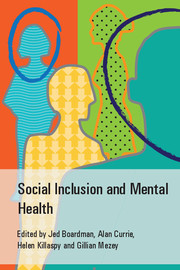Book contents
- Frontmatter
- Contents
- List of contributors
- List of tables, boxes and figures
- Foreword
- Preface
- Acknowledgements
- Scoping Group on Social Inclusion, Royal College of Psychiatrists
- Part 1 What is social exclusion?
- Part 2 Social exclusion: the scope of the problem
- 7 The extent of disadvantage, poverty and social exclusion in the UK
- 8 How are people with mental health problems excluded?
- 9 Social exclusion in specific social groups and individuals with mental health problems
- 10 Social exclusion and people with mental health problems: developing a clearer picture
- 11 Finding acceptance: the experiences of people who use mental health services
- 12 Social inclusion from the carer's perspective
- Part 3 Working towards inclusive psychiatry
- Index
8 - How are people with mental health problems excluded?
from Part 2 - Social exclusion: the scope of the problem
Published online by Cambridge University Press: 01 January 2018
- Frontmatter
- Contents
- List of contributors
- List of tables, boxes and figures
- Foreword
- Preface
- Acknowledgements
- Scoping Group on Social Inclusion, Royal College of Psychiatrists
- Part 1 What is social exclusion?
- Part 2 Social exclusion: the scope of the problem
- 7 The extent of disadvantage, poverty and social exclusion in the UK
- 8 How are people with mental health problems excluded?
- 9 Social exclusion in specific social groups and individuals with mental health problems
- 10 Social exclusion and people with mental health problems: developing a clearer picture
- 11 Finding acceptance: the experiences of people who use mental health services
- 12 Social inclusion from the carer's perspective
- Part 3 Working towards inclusive psychiatry
- Index
Summary
From the evidence presented in Chapter 6 we can readily see that many people with mental health problems and those with learning disability are likely to be represented in the areas of disadvantage illustrated. In this chapter we will examine this further across all age groups and types of mental health problems and detail the ways in which exclusion may take place. Exclusion is described across the five general areas of participation described in Chapter 3: consumption (exclusion from material resources), production (exclusion from socially valued productive activity), social interaction (exclusion from social relations and neighbourhoods), political engagement (exclusion from civic participation), health and health service engagement (service exclusion). People with mental health problems may be excluded in any one, or more, of these areas and, not surprisingly, there are associations between the factors that act as indicators of exclusion.
We are all aware that people with mental health problems are not a homogeneous group but have a range of incapacities and have varying risks and experiences of exclusion. Notwithstanding individual differences, it is generally clear that some groups are particularly at risk of exclusion, especially those who experience psychoses and those whose problems fall into multiple diagnostic categories. In this chapter I have attempted to differentiate the evidence for exclusion in people with psychoses or other severe mental health problems from those with disorders that are more prevalent in the general population, often termed the ‘common mental health problems’.
In trying to find evidence for the ways in which people with mental health problems and with learning disability are excluded, a range of publications has been quoted, including both the research literature and the ‘grey’ literature. It is often difficult to find evidence for associations between mental health problems and material disadvantage or inequality, particularly at the population level, not because the evidence suggests that there is no association, but because there is a lack of published evidence. In the UK this has been partly remedied by the British national surveys of psychiatric morbidity (Melzer et al, 2004).
- Type
- Chapter
- Information
- Social Inclusion and Mental Health , pp. 135 - 172Publisher: Royal College of PsychiatristsPrint publication year: 2010

